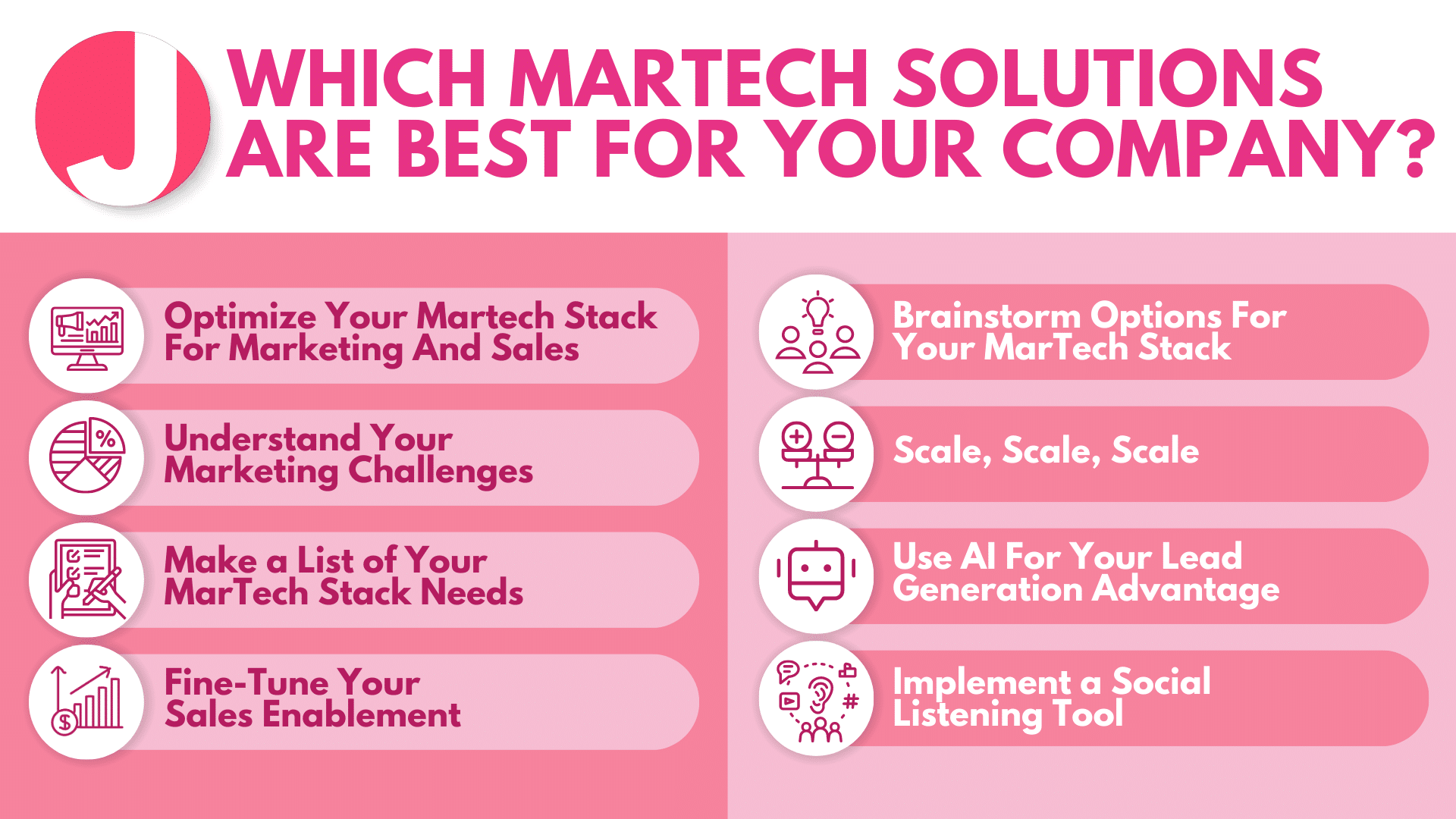
MarTech Tips for 2023
Last Updated on December 1, 2025 by Valerie Jennings
You’ve been hearing a lot of buzz around MarTech and how it can help move your business ahead of the competition. Having the right tools can indeed provide an edge, but only if you choose the right ones for your needs. But, you need to know the kinds of marketing challenges your company faces and which are most important to solve first. This guide offers tips on how to evaluate solutions that could help optimize your MarTech stack.
Optimize Your MarTech Stack For Marketing And Sales
A MarTech stack is a collection of software solutions that work together to optimize a business. The term refers to the different types of marketing and sales technologies, like CRM (customer relationship management), marketing automation, analytics and data visualization tools. Integrating sales and marketing should be a critical part of your growth marketing strategy and investing in a CRM tool can be extremely beneficial. According to Business.com it is an essential key tool in modern business keeping all company departments in sync.
You can build a custom MarTech stack by selecting from a wide range of available solutions. You may choose one or two products from each category or a more comprehensive suite with dozens of integrated options.
The benefits of having a custom-built stack include:
- Improved customer engagement,
- Faster acquisition rates and
- Lower cost per lead.
We implemented a complete CRM system for our client AutoVentive using Zoho. MarTech stacks allow clients and the agency to strategically merge sales and marketing efforts by using a complete sales dashboard and detailed reporting.
It’s also important to have a central platform for tracking your sales pipeline, targeting email campaigns and evaluating how sales and marketing teams are performing. Zoho CRM is a market leader we use to help businesses organize their customer relationships using AI features, sales management, marketing automation, analytics and more.
Understand Your Marketing Challenges
Before evaluating any new MarTech solution, it’s important to understand your challenges and needs. This means understanding what you want to achieve with a particular tool and how it will help reach business goals.
It’s best to be specific when defining goals rather than generalizing them. For example, instead of saying “I need more leads” or “I want more conversions,” try saying “I want 5% more leads within the next year.” This lets you work with the vendor to identify specific metrics most important to measuring success in the short- and long-term.
Make a List of Your MarTech Stack Needs
A needs list should consider all four areas:
- The customer’s needs — what is the user experience like for them?
- The company’s needs — how does this affect our bottom line?
- The sales team’s needs — how does this help us close more deals?
- The marketing team — they’ll need specific tools to succeed!
The customer experience (CX) is a key component of marketing. It’s important to understand how customers perceive your brand and what they think about your product or service. CX can be measured in many ways, such as:
- Analyzing the language they use on social media;
- Monitoring their comments on review sites; or
- Conducting surveys with customers who’ve used your products or services.
CX is about more than looking at what customers say — it includes understanding their journey through the buying process. This process begins when they discover your business or services and continues through post-purchase follow-up activities, like customer service calls or emails.
The goal of customer-centric marketing strategies isn’t only about lead generation only to generate leads but customer retention. Loyal customers are more likely to become brand evangelists and refer others based on their experiences.
Fine-Tune Your Sales Enablement
Sales enablement provides a sales team with the tools, resources and training needed to be successful. It’s important to understand what your sales team needs to be successful before building out a strategy for sales enablement. It’s a crucial component of any B2B marketing strategy. A well-executed program can increase pipeline velocity while driving down costs per lead by reducing waste and increasing efficiency within your organization.
Brainstorm Options For Your MarTech Stack
Once you’ve identified what needs to be done, it’s time to evaluate the options. Again, don’t make this process too complicated — use a simple pro and con list or go the more detailed route:
- List any pros of each option (e.g., “website optimization will improve our traffic by x%”).
- List any cons of each option (e.g., “website optimization will cost $x/month for x months”).
Also, take into account the features and benefits of each solution, or simply list them out as bullet points. Keep in mind the cost information for each solution to make an informed decision about which MarTech solution best fits your needs and budget requirements.
Scale, Scale, Scale
As important as buying a new tool or service is, scaling a stack for growth is even more essential. A well-thought-out stack has the flexibility to adapt to whatever marketing needs come up as the company grows and evolves.
A big part is having the right people in place who can manage systems and processes properly. Choose tools based on whether they can scale when needed — not because they’re trending or they’re cool.
When building out a new solution in your MarTech stack, ask yourself:
- Can I scale this?
- What kind of support do I need?
- How do we make sure everyone is trained and ready?
- Do we have enough people with expertise on how this works?
- Is there room here for growth?
These questions help determine if the solution makes sense for your requirements now but has built-in flexibility for later. A great example and tool is the utilization of AgencyAnalytics, one of our favorite reporting tools. It helps monitor and report on advertising, social media and channel growth for month-to-month and year-over-year. It also provides data and insights to aid in plotting trends.
 Use AI For Your Lead Generation Advantage
Use AI For Your Lead Generation Advantage
JSMM is at the forefront of MarTech AI LinkedIn programs using various programs and LinkedIn Sales Navigator. According to Deloitte’s article, it’s generated a 44% success rate for our MedTech clients who want to connect, engage and schedule meetings with prospects. The success lies in MarTech AI programs working together to help make the most of your time on LinkedIn by offering a personalized recommendation for which connection or company to reach out to next.
For example, we designed and implemented a MarTech stack for current clients AutoVentive and FLEXRail by integrating and automating their marketing and sales processes. Their stack includes:
- Websites;
- Zoho;
- LinkedIn Sales Navigator;
- LinkedIn outreach;
- Custom list development and more.
“Val and her team have a done great job for us. Their hard work, creativity and hustle are exactly what we need. They have become a part of our team. We highly recommend them.”- Darrin McElroy, CEO of Apex Management Group Holdings and business development officer for Liberty Hill Equity Partners.
Implement a Social Listening Tool
Social listening is no longer only a marketing tool; it’s an essential business process. The way we listen to and engage with social media is changing. It’s critical for expanding your content strategy, learning what prospects are talking about, evaluating trends across channels and establishing a unique strategy across social media platforms. Many tools are available to help you collect data and to target the right audience at the right time.
At the end of the day, it’s all about finding a MarTech stack that fits your business needs. That said, JSMM is here to help!
Contact us today for more information or to discuss how we can help optimize your marketing stack with our cutting-edge solutions.



 Use AI For Your Lead Generation Advantage
Use AI For Your Lead Generation Advantage